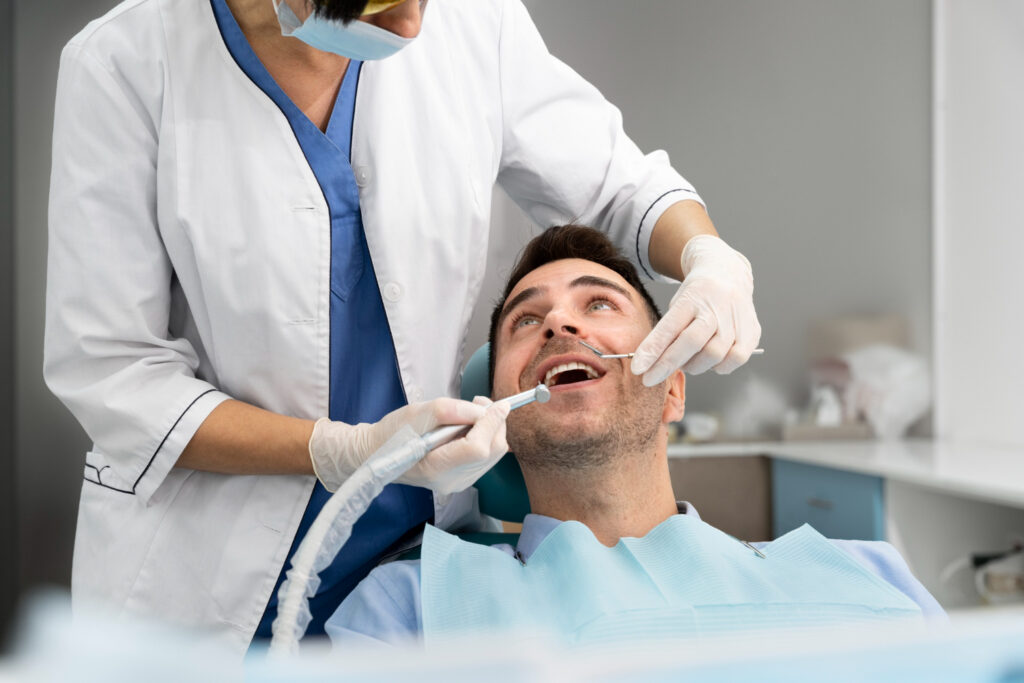PROUDLY SERVING DENTAL PRACTICES AND
DENTAL PROFESSIONALS NATIONWIDE
PROUDLY SERVING DENTAL PRACTICES AND
DENTAL PROFESSIONALS NATIONWIDE

Many people wonder, “Can dental assistants clean teeth?” The short answer: it depends on your state. Across the U.S., each region has its own rules that define the what can dental assistants do under professional supervision.
Understanding the dental assistant job description, dental assistant duties, and what can dental assistants do legally in your state will help you avoid mistakes and work confidently within your scope.
This article explores the dental assistant job description, legal framework around dental assistants performing teeth cleaning, highlights differences across states, and clarifies the boundaries of their role.
The dental assistant job description typically includes supporting dentists and dental hygienists during procedures, managing patient records, sterilizing instruments, and preparing treatment rooms. Dental assistants play a vital role in ensuring the smooth operation of dental offices. However, their clinical responsibilities are limited compared to dental hygienists, especially when it comes to procedures like teeth cleaning.
Before exploring cleanings, let’s define the general dental assistant job description. At its core, it includes:
These are the standard dental assistant duties in almost every state.
Under a dentist’s supervision, most dental assistants can:
But the ability to clean teeth, including scaling and polishing, depends on your state’s dental board rules.
“Cleaning teeth” can mean:
The simple answer to can dental assistants clean teeth is: in most states, no. Teeth cleaning, also called prophylaxis, involves removing plaque, tartar, and stains through scaling and polishing. This procedure requires specialized training and licensure, which dental assistants do not have.
According to dental regulatory bodies and educational sources, cleaning teeth is outside the scope of practice for dental assistants. Only licensed dental hygienists or dentists are permitted to perform cleanings. Dental assistants may assist during cleanings by preparing instruments, suctioning, or documenting treatment but cannot perform the cleaning themselves.
However, some states allow dental assistants to perform light cleanings or polishing under supervision or with certification. Because of this, many dentists ask: What can dental assistants do in my state?
Here’s a simplified breakdown:
In states like Utah, Maryland, and Kentucky, dental assistants may perform dental assistant duties that include polishing teeth or removing supragingival plaque after additional training or certification.
Most states, like California, New York, and Texas, do not allow assistants to clean teeth unless they are licensed dental hygienists. In these regions, aspiring dental assistants must direct cleaning tasks to hygienists or dentists.
District of Columbia: Introduced a Level 3 dental assistant category allowing certain expanded functions like coronal polishing and sealants under supervision.
Michigan: Created an unlicensed dental auxiliary designation with specific permitted duties.
Oklahoma: Allows dental assistants with expanded duty permits to perform tasks such as coronal polishing and fluoride application.
South Dakota: Changed supervision levels for certain procedures performed by registered dental assistants.
Each state differs, so asking “what can dental assistants do in this region?” is essential before starting.
Cleaning teeth requires knowledge of oral anatomy, disease prevention, and specialized instrumentation. Dental hygienists complete extensive education and clinical training to perform prophylaxis safely and effectively. This training includes:
Because of these complexities and patient safety concerns, laws restrict teeth cleaning to licensed hygienists or dentists.
Though dental assistants cannot perform cleanings, they play an important supportive role during these procedures, such as:
This teamwork ensures efficient and effective patient care.
Performing teeth cleaning without proper licensure can lead to serious consequences, including:
Dental assistants must always adhere to their state’s dental practice act and scope of practice to avoid these risks.
In states that allow assistant cleanings, here’s what’s often included:
Still, deep scaling or periodontal work typically remains exclusive to hygienists with advanced licenses.
Here’s a quick guide:
Step | How to Confirm |
1 | Visit your state’s dental board website |
2 | Search for “expanded functions dental assistant” |
3 | Check CE requirements and certification classes |
4 | Confirm the dental assistant duties allowed |
5 | Employers may list rules in job descriptions |
Educating yourself ensures you’re competent and legally compliant.
To understand the exact dental assistant job description and allowed duties in your state, consult:
Regularly reviewing these resources keeps you informed about any changes in regulations.
Understanding both sides helps clinics and assistants make informed decisions.
Compliance boosts reliability and safety in dental offices.
Can dental assistants clean teeth? The answer depends on your state. Check local regulations, complete certifications where allowed, and understand your expanded dental assistant job description. Knowing what can dental assistants do not only makes you a stronger team member, but also opens new professional opportunities in states that permit assistant cleanings.
By staying informed and proactive, you can confidently expand your role as a dental assistant and contribute more to patient care.
If you’d like a customized list of state rules, training course suggestions, or support finding a placement through a dental temp agency, just ask!